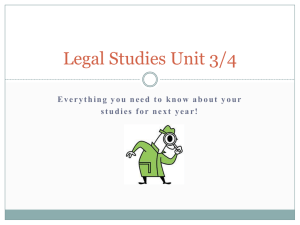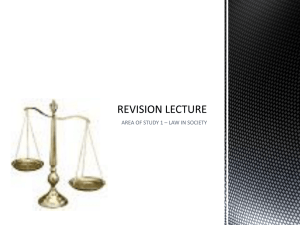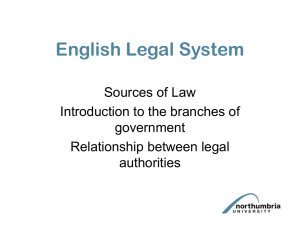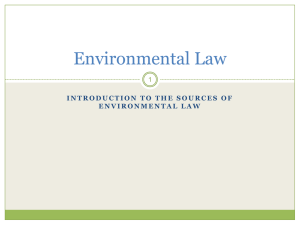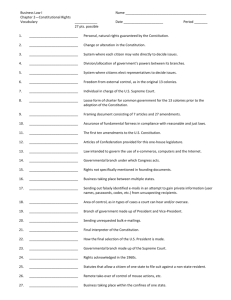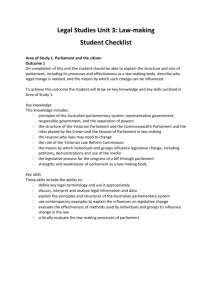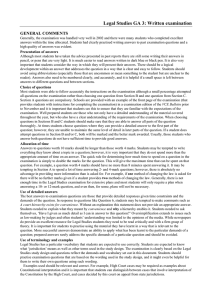Legal Studies Unit 3/4
advertisement
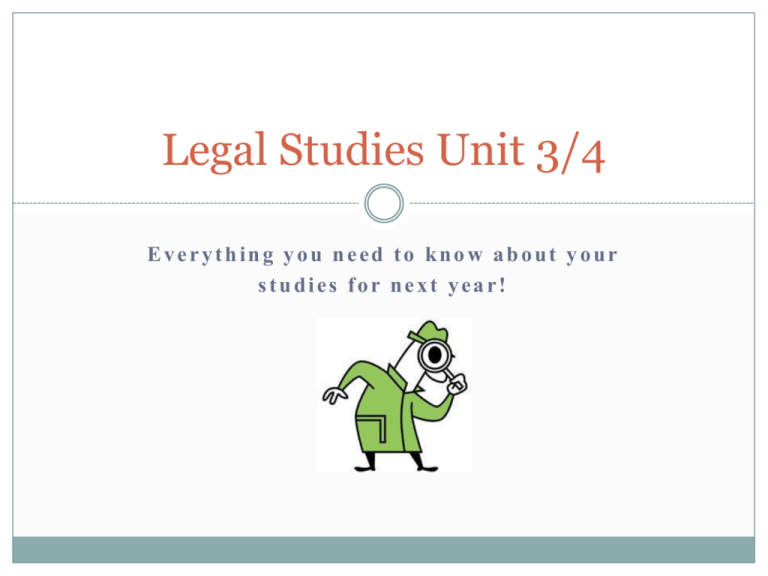
Legal Studies Unit 3/4 Everything you need to know about your studies for next year! Unit 3: Law Making This Unit consists of 3 areas of study (A.O.S.): Parliament and the Citizen The Constitution and the protection of rights Role of the courts in law-making A.O.S. 1: Parliament & the Citizen Covers the structure and role of parliament, including its processes and effectiveness as a lawmaking body, describing why legal change is needed, and the means by which change can be influenced. A.O.S. 2 The Constitution and the protection of rights Covers the role of the Commonwealth Constitution in defining law-making powers within a federal structure, the means by which law-making powers may change, and the effectiveness of the Commonwealth Constitution in protecting human rights. You will be comparing the protection of rights in Australia with the protection of rights in the U.S.A. A.O.S. 3: Role of the courts in law-making Covers the role and operation of courts in law- making, their effectiveness as law-making bodies and their relationship with parliament. We will be going on an excursion to the courts in semester 2. Unit 4: Resolution of Justice This unit consists of 2 areas of study (A.O.S.): Dispute resolution methods Court processes and procedures, and engaging in justice A.O.S. 1: Dispute resolution methods Covers the effectiveness of institutions and methods for the determination of criminal cases and the resolution of civil disputes. A.O.S. 2: Court processes and procedures, and engaging in justice Covers the processes and procedures for the resolution of criminal cases and civil disputes, and the evaluation of their operation and application, and the effectiveness of the legal system. Textbook The text for 2016 is “Key Concepts in Legal Studies Units 3 & 4” 2nd edition by Wilson, Smithies and Farrar This may be available to purchase as a second-hand copy You may like to purchase a study guide – the recommended version is by Michelle Humphries and has a hand-print on the front Equipment/Stationery You will need either loose-leaf paper or a workbook You may be required to submit work in plastic pockets You MUST always come to class equipped with pens and paper; if there is some reason why you don’t have your class resources speak to your teacher Haven’t Done Legal Units 1/2? There is no requirement that you must have done units 1/2 prior to doing units 3/4 However, it is STRONGLY recommended that you familiarise yourself with key terminology The glossary in the back of the text is an excellent place to start What Skills are Required? It’s not enough just to remember facts The emphasis in Legal Studies Units 3/4 is on analysis and evaluation There’s a lot to remember so being organised and revising past topics on a regular basis will help What you WON’T be Learning! You won’t be studying lots of criminal cases – that’s not a focus in units 3/4 Assessment Your end of year exam will make up 50% of your overall assessment: You will have 2 hours writing time and 15 minutes of reading time to respond to approximately 13 questions, including one 10 mark question. The exam will cover both units 3 & 4. The 10 mark question can come from unit 3, unit 4 or a combination of the 2 Internal Assessment (SACs) Your SACs will make up the remaining 50% of your assessment in this subject: Unit 3: Outcome 1 on the Parliament and the Citizen makes up 25% of your internal assessment for the Unit, Outcome 2 on the Constitution makes up 50% and Outcome 3 on Courts and Law Making 25%. Unit 4: Outcome 1 on Dispute Resolution Methods makes up 40% and outcome 2 on Court Processes and Procedures makes up 60% These SACs will be in the form of tests with the structure mirroring the end of year exam. Holiday Homework The first few pages of the text have been scanned and are available in Moodle. Your task is to read the scanned pages and complete the activities on page xix – questions 1-9. You should have these ready to submit at your 1st class in 2016. You also must complete the holiday homework handout – lowering the voting age. Keep an eye out for interesting cases in the media over the holidays!
